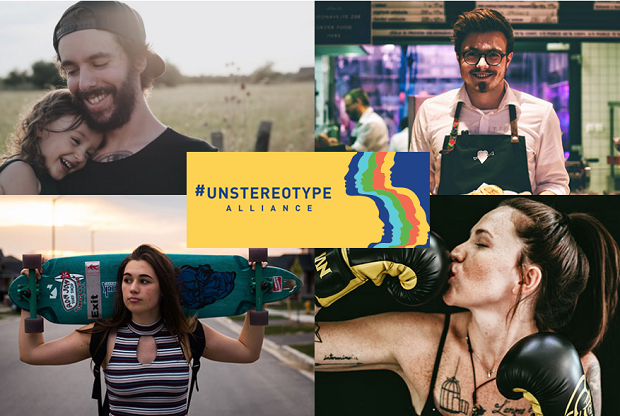The World Federation of Advertisers (WFA) has launched new guidance designed to help brands ensure their advertising reflects a more progressive portrayal of both sexes.
A Guide to Progressive Gender Portrayals in Advertising; the Case for Unstereotyping Ads has been unveiled at the WFA’s Global Marketer Week in Tokyo.
The guide aims to inspire senior marketers to challenge their own marketing communications with compelling evidence of a business case for unstereotyping ads from some of the world’s leading brands – as well as implications for inaction.
The launch is part of the WFA’s commitment as a founding member of the #Unstereotype Alliance, which was launched by UN Women with the support of multiple global brands, including Unilever, Procter and Gamble, Mars, Diageo, Johnson & Johnson and Mattel in Cannes last year. Through the WFA’s network of 60 national advertiser associations around the world and the tens of thousands of brands represented by them, it hopes to build momentum for unstereotyping globally in companies small and large.
The report covers both the issue of women’s portrayal in advertising as well as the stereotypes that can equally exist around the depiction of men in ads.
Keith Weed, Chief Marketing and Communications Officer, Unilever expressed his support: “I wholeheartedly welcome WFA’s efforts to help spread the message of the Unstereotype Alliance. We’ve started to see real progress but it doesn’t yet go far enough or wide enough. Our job won’t be done as long as ads still diminish or limit the role of women and men in society. I hope that this WFA guide can share knowledge and insights across global brand owners, and critically, to their 60 national advertiser associations on six continents so that they can see why this is no longer just a social imperative but a business one. This is exactly the kind of collective, cross-sector collaboration that is needed and which I hope leads to sustained transformation across our industry.”
Said Phumzile Mlambo-Ngcuka, United Nations Under-Secretary-General and Executive Director of UN Women “We know that harmful stereotypes of both women and men have a deep impact on how we see and treat each other. Intentionally changing those images has huge potential to positively transform our culture and bring us closer to true, inclusive equality. UN Women applauds the work of WFA to bring this to life, redefining how the industry shows who people are, not just what they are. This change will help us to collectively realize the promise of the Sustainable Development Goals – to leave no one behind.”
The guide outlines the benefits of taking a more progressive approach from a political and social perspective, as well as the business benefits for brands, particularly given the number of purchase decisions that are influenced or made by women.
It also provides marketers with practical tips about how they can bring about change in their own organisations. It identifies key steps that brands should take to ensure their organisations more broadly embrace the unstereotype movement, such as ensuring they have diverse teams both internally and at their external partners, tracking performance, identifying a clear purpose that enables the brand to celebrate diversity, thinking long-term and reaching out across the company, well beyond the marketing department.
A Guide to Progressive Gender Portrayals in Advertising; the Case for Unstereotyping also includes insights from and steps taken by senior marketers at Johnson & Johnson, Unilever and Diageo as well as innovative case studies from around the world featuring other brands that have tried to positively address gender stereotypes in advertising.
“Diversity comes in many forms and advertising can play a huge role in showcasing and celebrating the extraordinary mosaic of human diversity. There are many political and social reasons why brands should do this but at the end of the day there is a wealth of evidence underpinning a compelling business case to act,” said Stephan Loerke, CEO of the World Federation of Advertisers.
“Our industry needs to be brave enough to depict society in a realistic way rather than reinforce potentially harmful stereotypes. We’re witnessing a broader movement; it’s time for the marketing industry to play its part in promoting and reflecting diversity and equality in all its different facets and guises and at a global level,” said David Wheldon, CMO RBS and WFA President.
Alison Lewis, Chief Marketing Officer, Johnson & Johnson Consumer added; “We are strongest as an industry when we come together, as the Unstereotype Alliance demonstrates. This great work by WFA is an invaluable resource for all of us: from the junior marketer who wants to support the cause but isn’t sure how to get started, to the C-suite leader who has already given the green light to empowering ad campaigns and is ready to push the envelope even further. We’re in the middle of a cultural moment when real change is possible – these guidelines from the WFA offer a clear roadmap of the intentional, inclusive actions that need to be taken if we truly want to make gender stereotypes in advertising a thing of the past.”
“Addressing gender stereotypes is only the first step. Going forward it is our ambition to address other dimensions of diversity too. Gender stereotypes do not exist in a vacuum but are rather often entwined with others about race ethnicity, sexual orientation, physical ability, class and education,” added Loerke.
